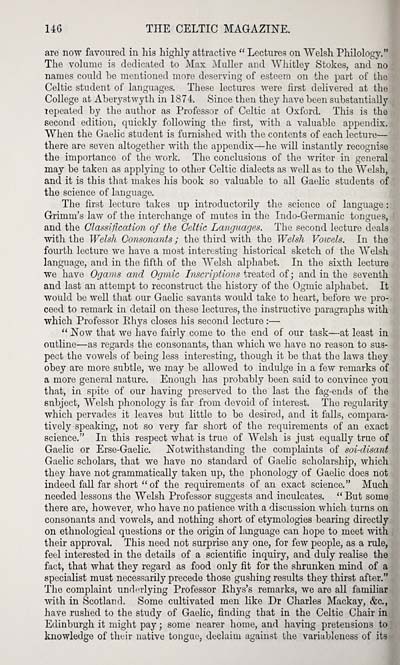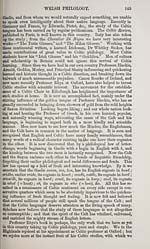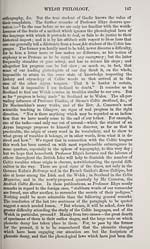Blair Collection > Celtic magazine > Volume 5
(156)
Download files
Complete book:
Individual page:
Thumbnail gallery: Grid view | List view

146 THE CELTIC MAGAZINE.
f
are now favoured in his highly attractive " Lectures on "Welsh Philology."
The volume is dedicated to Max Muller and Whitley Stokes, and no,
names could be mentioned more deserving of esteem on the part of the
Celtic student of languages. These lectures were first delivered at the
College at Aberystwyth in 1874. Since then they have been substantially , ,
lepeaied by the author as Professor of Celtic at Oxford. This is the ■,
second edition, quickly following the first, with a valuable appendix.
When the Gaelic student is furnished witli the contents of each lecture —
there are seven altogether with the appendix — he will instantly recognise
the importance of the work. The conclusions of the writer in general
may be taken as applying to other Celtic dialects as well as to the Welsh,
and it is this that makes his book so valuable to all Gaelic students of ^)
the science of language.
The first lecture takes up introductorily the science of language : •
Grimm's law of the interchange of mutes in the Indo-Germanic tongues,
and the Classification of the Celtic Languages. The second lecture deals (
witli the Welsh Consonants ; the third with the Welsh Vowels. In the }
fourth lecture we have a most interesting historical sketch of the Welsh
language, and in the fifth of the Welsh alphabet. In the sixth lecture
we have Ogams and Ogmic Inscriptions treated of; and in the seventh
and last an attempt to reconstruct the history of the Ogmic alphabet. It
would be well that our Gaelic savants would take to heart, before we pro-
ceed to remark in detail on these lectures, the instructive paragraphs with
which Professor Rhys closes his second lecture : —
" Now that we have fairly come to the end of our task — at least in
outline — as regards the consonants, than which we have no reason to sus-
pect the vowels of being less interesting, though it be that the laws they
obey are more subtle, we may be allowed to indulge in a few remarks of
a more general nature. Enough has probably been said to convince you
that, in spite of our having preserved to the last the fag-ends of the
subject, Welsh phonology is far from devoid of interest. The regularity
which pervades it leaves but little to be desired, and it falls, compara-
tively speaking, not so very far short of the requirements of an exact •
science." In this respect what is true of Welsh is just equally true of
Gaelic or Erse-Gaelic. Notwithstanding the complaints of soi-disant
Gaelic scholars, that we have no standard of Gaelic scholarship, which
they have not grammatically taken up, the phonology of Gaelic does not
indeed fall far short "of the requirements of an exact science." Much
needed lessons the Welsh Professor suggests and inculcates. " But some
there are, however^ who have no patience with a discussion which turns on
consonants and vowels, and nothing short of etymologies bearing directly
on ethnological questions or the origin of language can hope to meet with
their approval. This need not surprise any one, for few people, as a rule,
feel interested in the details of a scientific inquiry, and duly realise the
fact, that what they regard as food only fit for the shrunken mind of a
specialist must necessarily precede those gushing results they thirst after."
The complaint underlying Professor Ehys's remarks, we are all familiar
with in Scotland. Some cultivated men like Dr Charles Mackay, &c.,
have rushed to the study of Gaelic, finding that in the Celtic Chair in
Edinburgh it might pay ; some nearer home, and having pretensions to
of their native tongue, declaim against the variableness of its -
f
are now favoured in his highly attractive " Lectures on "Welsh Philology."
The volume is dedicated to Max Muller and Whitley Stokes, and no,
names could be mentioned more deserving of esteem on the part of the
Celtic student of languages. These lectures were first delivered at the
College at Aberystwyth in 1874. Since then they have been substantially , ,
lepeaied by the author as Professor of Celtic at Oxford. This is the ■,
second edition, quickly following the first, with a valuable appendix.
When the Gaelic student is furnished witli the contents of each lecture —
there are seven altogether with the appendix — he will instantly recognise
the importance of the work. The conclusions of the writer in general
may be taken as applying to other Celtic dialects as well as to the Welsh,
and it is this that makes his book so valuable to all Gaelic students of ^)
the science of language.
The first lecture takes up introductorily the science of language : •
Grimm's law of the interchange of mutes in the Indo-Germanic tongues,
and the Classification of the Celtic Languages. The second lecture deals (
witli the Welsh Consonants ; the third with the Welsh Vowels. In the }
fourth lecture we have a most interesting historical sketch of the Welsh
language, and in the fifth of the Welsh alphabet. In the sixth lecture
we have Ogams and Ogmic Inscriptions treated of; and in the seventh
and last an attempt to reconstruct the history of the Ogmic alphabet. It
would be well that our Gaelic savants would take to heart, before we pro-
ceed to remark in detail on these lectures, the instructive paragraphs with
which Professor Rhys closes his second lecture : —
" Now that we have fairly come to the end of our task — at least in
outline — as regards the consonants, than which we have no reason to sus-
pect the vowels of being less interesting, though it be that the laws they
obey are more subtle, we may be allowed to indulge in a few remarks of
a more general nature. Enough has probably been said to convince you
that, in spite of our having preserved to the last the fag-ends of the
subject, Welsh phonology is far from devoid of interest. The regularity
which pervades it leaves but little to be desired, and it falls, compara-
tively speaking, not so very far short of the requirements of an exact •
science." In this respect what is true of Welsh is just equally true of
Gaelic or Erse-Gaelic. Notwithstanding the complaints of soi-disant
Gaelic scholars, that we have no standard of Gaelic scholarship, which
they have not grammatically taken up, the phonology of Gaelic does not
indeed fall far short "of the requirements of an exact science." Much
needed lessons the Welsh Professor suggests and inculcates. " But some
there are, however^ who have no patience with a discussion which turns on
consonants and vowels, and nothing short of etymologies bearing directly
on ethnological questions or the origin of language can hope to meet with
their approval. This need not surprise any one, for few people, as a rule,
feel interested in the details of a scientific inquiry, and duly realise the
fact, that what they regard as food only fit for the shrunken mind of a
specialist must necessarily precede those gushing results they thirst after."
The complaint underlying Professor Ehys's remarks, we are all familiar
with in Scotland. Some cultivated men like Dr Charles Mackay, &c.,
have rushed to the study of Gaelic, finding that in the Celtic Chair in
Edinburgh it might pay ; some nearer home, and having pretensions to
of their native tongue, declaim against the variableness of its -
Set display mode to: Large image | Transcription
Images and transcriptions on this page, including medium image downloads, may be used under the Creative Commons Attribution 4.0 International Licence unless otherwise stated. ![]()
| Early Gaelic Book Collections > Blair Collection > Celtic magazine > Volume 5 > (156) |
|---|
| Permanent URL | https://digital.nls.uk/76450768 |
|---|
| Description | Volume V, 1880. |
|---|---|
| Shelfmark | Blair.6 |
| Attribution and copyright: |
|
| Description | A selection of books from a collection of more than 500 titles, mostly on religious and literary topics. Also includes some material dealing with other Celtic languages and societies. Collection created towards the end of the 19th century by Lady Evelyn Stewart Murray. |
|---|
| Description | Selected items from five 'Special and Named Printed Collections'. Includes books in Gaelic and other Celtic languages, works about the Gaels, their languages, literature, culture and history. |
|---|

